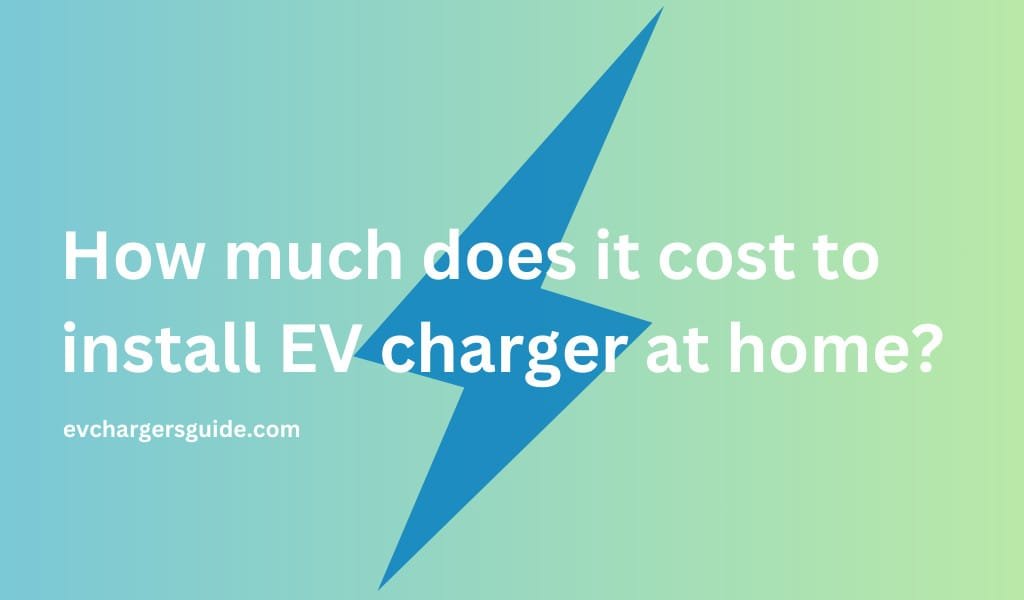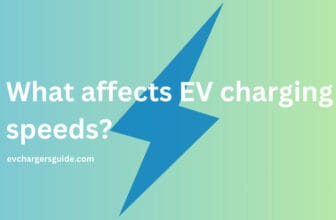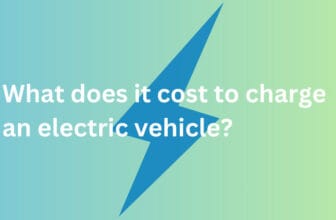
Home EV charger installation cost – depending on various things – can be almost near zero in ideal scenarios, but can reach up to $6,000-$7,000 for complex installations. (Excluding the purchase cost of charger)
But the average cost is coming to $1000-$1500 for plug-in charger and $2500-$3000 for hardwired charger.
Considering most plug-in chargers are Level 1, and even if it’s Level 2 it won’t require any major electric work as these are less powerful than hardwired ones.
While the chargers which require hardwire connection will be mostly powerful Level 2 chargers and most probably will require modification of electric system in the home with certain other electrical equipment including panels and breakers, and also will need more labor work, which makes it costlier to install.
However, remember many chargers there in market are inter-convertible, you can convert plug-in version to hardwired and vice-versa. So actual cost of installation can go up or down for both variants depending on how you install it.
So the kind of EV charger you choose to install (Level 1 or Level 2 with plug-in or hardwired connection), the present electric system in your home and the location of your home are the main factors affecting the cost variations.
As Level 1 charger runs on 110V/120V power and Level 2 charger on 220V/240V, so whether the required power line is available at the site of installation including all wirings and power source outlet will affect the total cost.
PLUS, other factors like material cost, labor cost, permits and inspection costs are the ones which vary by location.
Additionally, the complexity of installation is the one which varies from site to site. So accordingly labor cost and material costs can go up or down.
So here is the table showcasing the detailed breakdown of cost.
To understand it better I am categorizing the cost of installation by plug-in variant and Hardwired variant of charger.
Plug-in Charger:
| Factors | Cost |
|---|---|
| 110V/120V or 240V power supply and wall outlet is available | Almost No Cost (Excluding permits and inspection) |
| Cost to install new wall outlet for 110V/120V or 240V | Extra $150-$200 (Get the commercial graded outlet not usual one) |
| Cost to draw a new 220V/240V power line (If not available for Level 2 Charger) | Extra $800-$1500 |
| If separate electric panel is to be installed | Extra $400-$1700 |
| Hourly labor rate | $20-$50+ |
| If installed on a pedestal | Extra $500-$2000 (For pedestal kit) |
| Permits and Inspections | Extra $100-$500+ |
| Total Cost | $100-$1700 |
| Average Cost | $1000-$1500 |
Hardwired Charger:
| Factors | Cost |
|---|---|
| If 240V power supply is available | $750-$1500 |
| Cost to draw a new 220V/240V power line (If not available for Level 2 Charger) | Extra $800-$1500 |
| If separate electric panel is to be installed | $400-$1700 |
| Hourly labor rate | $20-$50+ |
| If installed on a pedestal | Extra $500-$2000 (For pedestal kit) |
| Permits and Inspections | $100-$500+ |
| Total Cost | $750-$6000 |
| Average Cost | $2500-$3000 |
Variable Costs:
Apart from permit inspection and labor costs, there are other expenses that can add to the total cost.
These expenses mainly depend on the complexity of installation like existing wiring setup and it’s accessibility, any underground wiring that requires trenches, which can add on the amount of labor and the extra material to complete the installation.
The material cost includes wiring and cables, circuit breaker, electric panel, wall outlets, trenches, or any specific electrical parts.
Not all materials are required for everyone. This was just a broad scope of what it could take. If your home is already equipped with necessary electric system to accommodate the load of an EV charger then the the total cost just comes down to a couple of hundred dollars, for labor and permits.
It is necessary to hire a licensed electrician to do the installation work.
However, certain EV chargers are just ready to be used (like some plug-in chargers) if a wall outlet is there, but still, it is recommended to have an electrician to check and inspect all electric setups at your home and install the EV charger if you are not familiar with these electric stuff.
Licensed electricians are the ones who will take care of all necessary permits and inspections, so you don’t worry about these things and just be ready to charge your EV at home.
Cost savings:
There are incentives for purchasing and installing an EV charger at home by US Federal Government. It provides 30% tax credit, up to $1000 on purchasing and installing EV charger for residential use.
And there are other incentives provided by state and utility provider, which again varies from state to state.
You can use this tool to find out whether you are eligible for rebates.
Conclusion
So I hope now you have clarity about expenses related to installing EV charger at your home.
OK then see you in the next article!
FAQs
Does a home EV charger add value to your house?
Yes, it for sure adds value to your house. Now EV chargers are becoming an asset adding value to the property. The main reason is installing an EV charger at home demands many things to fall into place. Like, electric systems, space for installation and charging facility.
It is because EV charger is a high-power appliance (in fact more than an appliance) and in the coming days adoption of EV chargers is only going to increase with the increasing users of Electric Vehicles. It already started making our new daily routine. And in most cases, installation of EV chargers is a hectic process and demands a couple of thousands of dollars to the least.
So if your home is EV charger ready then whether you use it for rentals or going to sell, it adds value to the buyer’s life. Because buyer is going to use it making their EV charging journey easy. And anything that makes our life easy definitely going to appreciate.
Is a home EV charger worth it?
Yes, it offers lot of benefits to EV users. Especially if you drive daily even 10-20 miles and especially those drive 50-100+ miles a day a Home EV charger makes your charging cost almost Half to 70%-90% cheaper than charging at a public charger.
In addition, you can charge at your own convenience if you have an EV charger at your home available at your footsteps – and more importantly, you can then spend your time with your family, doing some work or just go to sleep and forget about charging your EV while your vehicle is charging safely in your garage or parking space.
You don’t have to drive to a nearby public station and spend your important hours sitting idle or roaming around. It adds more convenience in our life by having Home EV charger.
PLUS, it also adds value to the property. When you want to sell, it will have an advantage over other properties because your house if EV charger ready with all needed infrastructure and charging facility.

![What is the cost to install Tesla charger at Home? [Detailed Guide]](https://evchargersguide.com/wp-content/uploads/2023/12/how-much-does-it-cost-to-install-tesla-home-charger.jpg)
















I got whooping $9k quote..! had to draw 240V line and install a panel with a separate circuit for 50amp Chargepoint Level 2 unit. First I thought whether I made wrong decision. But then thought it was needed. It was big chunk of work. But it also added required functions. Fortunately it happened during my home renovations.. everything looks cool now
I will get a plug-in unit in rebate from my utility provider with 32A power. I will just have to get one 240V outlet installed. It will cost way less.